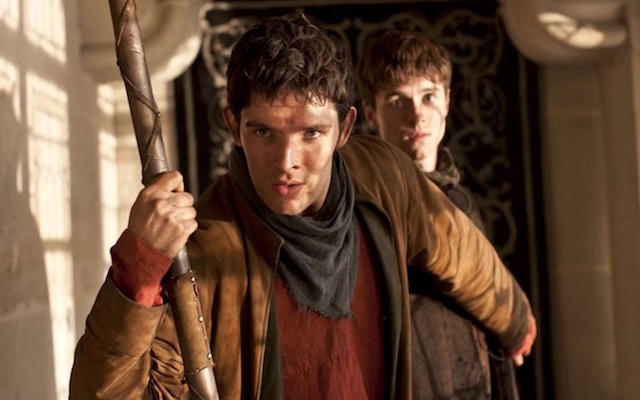Growing up, I loved the tales of King Arthur—the knights of the round table, Merlin, Excalibur, and Camelot.
In short, the stuff of legends.
A legend that largely developed out of a pseudo-historical 12th-century Latin work about the kings of Britain—many centuries before anybody had even heard about A Game of Thrones or The Lord of the Rings.
Despite the legend’s enduring popularity and my own fondness of it, I didn’t think there was something I could take away from the legendary tales that would have any relevance to life in the 21st century.
Then I discovered the show “Merlin,” a family-friendly BBC adaptation of the Arthurian legend, which depicts Merlin (played by Colin Morgan) and Arthur (Bradley James) as boys and later young men. Thus, the storyline begins long before Arthur becomes the “Once and Future King” and Merlin the “Greatest Sorcerer to Ever Walk the Earth.”
This early starting point makes the two legends much more accessible: instead of seeing them as larger-than-life, we get introduced to their flaws and imperfections, doubts and dilemmas. Furthermore, due to the show’s focus on destiny and the deep relationship between Arthur and Merlin, it also contains lessons that are relevant for us today.
Here are my main takeaways from the show (without spoilers beyond a general exposition):
1. Your gifts can feel dangerous.
In the show, young Merlin lives in a world where magic is punishable by death. In fact, his first impression upon entering Camelot is the public beheading of a man accused of sorcery. For someone destined to become the most powerful sorcerer to ever live, this hostile environment creates a predicament: his inborn magic is the greatest gift he could give to others, and the biggest threat to himself.
On the surface, Merlin’s predicament might not have much to do with the situations we might face as we consider what we want to do in our lives. After all, many of us typically do not face physical danger when pursuing our purpose (unlike firefighters entering a burning building, for instance).
However, living one’s life purpose and fully expressing one’s gifts can feel inherently dangerous even in the absence of a discernible physical threat. As somebody who helps people discover their life purpose, I am aware of how many immensely brave people find themselves scared to truly bring their gifts forward. They often feel deeply conflicted about staying in their current situation where they hide their gifts, or take the risk to come forward.
Their reluctance to expose themselves is understandable if we consider a key fact from our collective past. Our gifts are what make us unique. And while being different from others is acceptable today, there was a time in human history when belonging to a tribe was crucial for one’s survival. In that situation, standing in one’s full uniqueness likely threatened that sense of belonging to a group.
I believe that as a collective, we haven’t completely let go of the fear of being different, of not “fitting in” with our group, and that is part of the reason why our gifts can feel dangerous to us. In order to fully live our life purpose, we need to acknowledge this dynamic and find a way to move beyond it. This includes realizing that our fear can indicate that we are on the right track.
In a land of myth and a time of magic, the destiny of a great kingdom rests on the shoulders of a young man. #MERLIN pic.twitter.com/hNJrW42A
— Merlin Official (@MerlinOfficial) January 5, 2013
2. Hiding your gifts feels painful.
Unlike in the Arthurian legend, the show begins with Merlin deciding to hide his gift of magic. Instead of being an official adviser or sorcerer to the royal court, he simply takes on the role of Arthur’s servant. In a kingdom which prosecutes his kind, Merlin has to wield his magic in secret, without any recognition or thanks from those he helps with it.
Whereas we viewers get to see the full story and Merlin’s increasing power, in the show most of the people around him simply think of him as a clumsy and somewhat incompetent servant. This tension between who he is and who others see him as is so painful to watch that I quickly found myself rooting for Merlin to reveal his magic.
Just as hiding his gift of magic is painful for Merlin (albeit less so than being burned at the stakes), people often experience an inner tension when they feel that they are not living up to their potential. Because they often do not know what to do with this sense of unease, they may begin to stuff it down. However, in my experience from guiding people in their discovery process, it is important to feel that tension and acknowledge how painful it is to hide one’s gifts.
3. Being of service is crucial—and ultimately service is about love.
In the show, Merlin decides that it is his destiny to protect Arthur, and proceeds to do so continuously, even at the peril of his own life. At one point in the show, he tells Arthur, “I was born to serve you.”
While Merlin’s unequal social status combined with his unflinching devotion to his king is unpalatable in our age of post-modernity and democratic governance, his statement also hints at the enduring importance of service. If we remove the outdated social inequality, we are left with the recognition that life’s purpose has to do with being of service—whether to a person or to an idea.
Martin Luther King, Jr. put it this way: “Everybody can be great…because anybody can serve.” What we can take away from this is that to truly live our purpose, we need to find a way to serve somebody or something through it. Ultimately, purpose is not “me-focused.” It’s not about prestige or accolades, but about what we can do for others.
When it comes to finding our path in the world, it behooves us to keep this in mind. An excellent way to begin this process is to start asking the question: “Who is one person I can serve?”
The importance of service is also reflected in Arthur’s actions, when he, at various times in the show, makes it clear that he is willing to give up his own life for others. Arthur, thus, ultimately shows up as a servant-leader, as somebody whose commitment to leading a kingdom is borne out of a desire to help others more than out of a desire to have power.
At its purest, purpose is about service—and service is ultimately motivated by love. In the show, Arthur demonstrates the fundamental power of love when, in an utterly desperate situation, he encourages his knights with the battle cry, “For the love of Camelot.” In a similar vein, it’s Merlin’s friendship and love which consistently motivates him to go to crazy lengths to keep Arthur safe from harm.
What we can take away from this is that it’s actually love which can strengthen, fuel, and sustain one’s life purpose. In that sense, purpose is an outside expression of love.
~
If you’d like to explore your purpose further, I invite you to get access to my free guide here.
~
~
~
Author: Bere Blissenbach
Image: “Merlin” still
Editor: Travis May
Copy Editor: Khara-Jade Warren


 Share on bsky
Share on bsky





Read 0 comments and reply